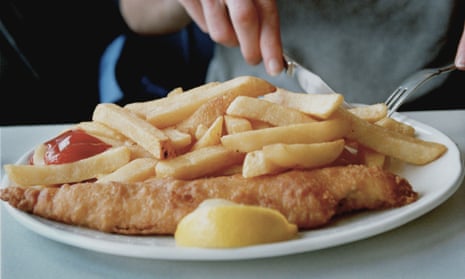A drug that works like an “imaginary meal” has been developed by US scientists who believe it could help combat soaring rates of obesity.
The drug mimics signals that are normally produced at the start of a meal when the body prepares for a fresh intake of food. The signals lead to a cascade of effects that burn body fat, reduce blood sugar and cholesterol levels, and ramp up metabolism.
Researchers at the Salk Institute in La Jolla, California, made the discovery after giving daily fexaramine to obese mice for five weeks. The drug was not absorbed in the animals’ bloodstreams, but instead went to work locally in their intestines, according to a report in the journal Nature Medicine on Monday.
The obese mice given fexaramine stopped gaining weight, lost body fat and had lower cholesterol levels than a control group of animals. Some of their white fat had apparently turned into the healthier brown form that is readily burned for energy.
“This pill is like an imaginary meal,” said Ronald Evans, a senior author on the paper and director of the gene expression laboratory at the Salk Institute. “It sends out the same signals that normally happen when you eat a lot of food.”
Fexaramine activates the farnesoid X receptor (FXR) found in the gut and other parts of the body. Stimulating the receptor affects how the body produces bile acids, digests food and stores sugars and fats.
Pharmaceutical companies have developed drugs to target FXR before, but these went into the bloodstream, raising concerns about side effects. By releasing the drug only in the intestine, the scientists hope it will be safer and more effective.
“It turns out that when we administer this orally, it only acts in the gut,” said Michael Downes, a co-author on the study. “We are hijacking the natural food signal in the body to trick it into burning calories and lower systemic glucose levels.”
The team hope to develop a pill for a clinical trial in the next two to three years to see whether the benefits seen in mice are replicated in humans.
Obesity rates in England have risen to around a quarter of all men and women in the past 20 years. The NHS advises obese people to replace unhealthy and high-energy items, such as fast food and sugary drinks, with healthier alternatives. The health service considers only orlistat to be a safe and effective anti-obesity pill. The drug works by preventing about a third of dietary fat from being digested.
Until larger clinical trials are completed, it is impossible to know whether fexaramine will have any role to play in combatting the problem. Many drugs that work well in mice turn out to be far less effective in humans and fail to make it to market.
“We now know that our sense of ‘fullness’ after meals is largely dependent on hormones produced in specialised cells scattered along the gut. These cells sense the nutritional content of our food and send out those signals in response to digested and partially digested food. If we could fool those cells into thinking we have had a meal that could be a way of reducing people’s food intake to produce safe weight loss,” said Professor Sir Stephen O’Rahilly, director of the MRC metabolic diseases unit at Cambridge University.
“The authors of this paper show that a particular drug they have tested can do that in mice. While these are interesting observations, only a modest percentage of drugs that seem effective in mice ever make it into the clinic for patients,” he added.
Nick Finer, a specialist in obesity medicine at UCL, said the work was “potentially of great importance to our basic understanding of how energy intake is balanced by energy expenditure, and potentially as to why this system is mismatched in those who gain – or lose – excessive weight.
“In the long-term it also offers a new approach to potential treatment of human obesity. Mice, however, are not human and much work is still needed to see if the effects of fexaramine are the same in humans and to establish its safety.”

Comments (…)
Sign in or create your Guardian account to join the discussion